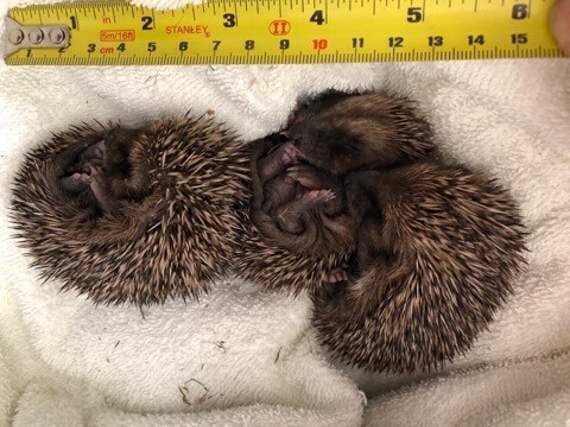AS autumn approaches, it is more important than ever for people to keep an eye out for the humble Great British hedgehog, according to one Launceston couple who are making it their mission to nurse the poorly or abandoned woodland animals to be released back into the wild.
Valda and Don Sharpe of Launceston have been running ‘Hendra Hedgehogs’ ever since they underwent a training course with Linda Squires from Hedgehog Care and Rehab Plymouth, and are now keen to urge people to be mindful of the adorable, nocturnal creatures who are very often visitors to our gardens. The Post caught up with them recently to gain an insight into their roles, along with ten-year-old granddaughters Demelza and Keziah — who are also fans of the little animals.
The reason the couple wanted to help the prickly little animals is simply due to seeing so many of them while out and about. On finding three one day, they took them to the vet and asked for advice, which is what led them to nearby Karen Lang, who runs the ‘Lang Hedgehog Hotel’ and said she had trained in Plymouth with Linda Squires, who was looking for more people to help care for poorly or distressed hedgehogs until they could be released into the wild.
Valda said: “Linda was looking for people to help out, and she’s actually looking for more carers before Christmas arrives. She keeps up to 70 (hedgehogs), but there just isn’t enough carers. She offers an afternoon of training and puts you in touch with hedgehog protection and the Vale (Wildlife Hospital), which is based in Gloucestershire and offers courses and advice for people wanting to care for hedgehogs. She (Linda) teaches you what medications to give, what to look out for and how to deal with it.”
With Don being a microbiologist and Valda having a background in nursing and midwifery, the couple are ideally set to care for these animals, whose numbers are sadly decreasing all the time in the wild. Valda joked: “Everything to do with hedgehogs is to do with poo, I’m afraid!”
After their training in Plymouth, Linda phoned Valda and Don to let them know they already had a few contacts in the city who needed the couple’s help: “After that they just kept rolling in! We mostly get them from the Plymouth, Callington and Saltash areas. If we have them in the autumn, we have to keep them over winter.”
Don added: “If they weigh under 600 grams at this time, then they don’t wake up.”
Currently, Valda and Don are caring for a family of five hoglets (baby hedgehogs), each weighing between 57g and 89g at just two weeks old. “It’s an all-night job if they’re under ten days,” Valda said. “We take in lots of babies. We work very closely with Castle Vets (The Castle Veterinary Group), who do all the vet care for us. We do the nursing care. If they’ve got an injury, the vets will work with us to deal with that.”
One of the hedgehogs in Valda and Don’s care came in with a broken leg, and at first it was unclear if she would pull through. Valda said: “She came in with a broken leg, which at first we thought she would have to be put down. But the vet gave us the information, and we said, let’s give her a chance, so she had her leg amputated. Because she had the amputation, unfortunately it means she will not be able to go out on her own into the wild, so Cassidy — although the grandchildren call her ‘Stumpy’ — lives in our garden. We have a nice walled garden so she’s enclosed and safe. We never see her, but she’s out there somewhere.”
One of the main issues facing hedgehogs today is their gradual decrease in population, as natural environments are broken down or threatened by humans. Don said: “One of the main issues is, people leave it too long. If a hedgehog is out in the day, that is not right. And it should never be out in the sun.”
Valda added: “Some people see hedgehogs when the sun is out and they think, they’re just enjoying the sunshine, but that’s not the case. Occasionally in the spring you might see female hedgehogs rustling about because they’re making nests — that’s normal — but other than that they should not be out in the day.
“By the time two days have gone by, the hedgehog will be very dehydrated, extremely so, and flies will have begun to hatch eggs on them. It’s very hard to fight back after they get that poorly.”
The first and main priority when finding a hedgehog is to get them warm. Valda said: “The first few hours take a lot of work. You’ve got to keep them warm — we use a hot water bottle. If they’re injured or it’s something we can’t do, we’ll ring the vet. One of the main problems we have is the use of metaldehyde, the little blue pellets people put down in their gardens (to kill slugs). Once the hedgehogs eat the slugs that have been affected by them, it poisons them and it just gradually gets worse — it’s heartbreaking.
“It has been found that the rural hedgehog is not doing as well as the suburban hedgehog. This could be because of competition with badgers, and also if a badger gets a taste for hedgehog, then that’s it.”
The couple keep any hedgehogs they rescue in their home, as they do not carry fleas — although there are some less than pleasant smells produced. “They are the dirtiest animals I have ever seen,” Don said. “Because they’re nocturnal they don’t come out until the evening. We tend to find that after it eats its food, it then poos in the bowl!”
“But they are adorable,” Valda said. “The babies are so miniature and just curl up in little balls to go to sleep.”
From a young age, the hedgehogs are fed on tins of dog milk which Valda and Don buy especially for them. Cow’s milk is discouraged as it can upset their stomachs. “It’s a very expensive job,” Valda said. “The hoglets’ prickles come through really quickly — they have two sets, they start off with white prickles.
“The ones we have at the moment we had in July, and they’ll be ready to go on September 20 if they weigh 600g. When they’re 600g, we take them to a place for a soft release. We let them go but support them with food and water. We find they don’t tend to hang around for very long, and they do prefer wild food.”
“We don’t buy mealworms because they’re like crisps for hedgehogs,” Don said.
“And we don’t give them fish — not because it’s not good for them to have, but because they don’t like it. They associate it with gone-off food. We feed them on good quality dog food with chicken and other poultry. We also use cat kibble, because in the summer you can put it out and it doesn’t attract flies. But the most important thing is keeping them warm. We use microwavable heat pads and also start by putting them in the airing cupboard with the heat pads or a hot water bottle.”
Just like any other animal, the hedgehogs all have their own unique personalities, and Valda and Don can’t help but name the adorable little animals — with the likes of twins Simon and Sally, Pascal, Peggy-Sue and Cassidy all making it into their care.
Valda said: “A few of them are quite tidy, some are really hissy — they hiss and spit at you. We had one who used to hiss whenever we’d come near, and she’d curl up in a little ball and kick her legs at you, so all you could see were these tiny paws kicking out towards you from the prickles — they can be quite fierce. Others are really placid and nosy.”
As we enter the autumn season and the colder weather approaches, Valda and Don are keen to make sure people know what to do to secure the British hedgehog’s future. Don said: “Peggy-Sue was originally released, but she lost so much weight in the autumn that we brought her back in for the winter. We fed her up again and she was released in April.”
Valda continued: “We have visited schools before and taken in a couple of hedgehogs and tell the children all about it. It’s pretty good to get some basic information to them. It’s the basic stuff that needs to be out there — what to do and what not to do.
“Hedgehogs can be very careless — they do tend to lose their babies. Sometimes you’ll find the mum will be walking around with some of her babies, and then two are elsewhere, sometimes you’ll just see a tiny hedgehog in the middle of a car park! They sound like birds, making a very high-pitched cheeping sound. When they make that sound, it usually means they are desperately hungry and distressed. If you see this, leave them for a short while and see if mum comes back, and if not, act fast.
“Ring the vet or a local rescue for advice. You can’t feed them until they have got to a certain temperature because their food won’t digest, so again, getting them warm is the first thing to do. We use a hot water bottle wrapped in a towel or blanket, and microwaveable heat pads — I wouldn’t say it’s a cheap thing to do. It’s a daily job, you can’t skip it.”
The sad reality makes local hedgehog rescues vitally important, with one third of the hedgehog population having been lost in just 20 years, and only around a million left living in the wild in the UK today.
Don said: “Anything we can do to help them and release them back into the wild is a positive.”
Hendra Hedgehogs is normally home to around ten hedgehogs at a time, but this summer they found themselves looking after 15 at one stage as they were taking in families of hoglets whose mothers were nowhere to be seen.
Valda said: “It’s almost like having a full time job! But you just think, if you don’t do it, who’s going to do it?
“When we first started, we needed to buy all the medical supplies, like replacement fluids, and it’s important to get a sympathetic vet that trusts you. We don’t really fundraise — occasionally if someone brings a hedgehog in they might give you £20 as a donation. The dog milk we feed them on is £15 for one tin, and when they start getting bigger you find yourself spending between £50 and £100 per hedgehog. Then you need things like syringes (to feed), needles and medicine, so people can donate — or they can donate food.
“We know a busy time is coming, Linda said to expect a very busy autumn. It does restrict our lives a bit, but I suppose with our background — with ten children and fostering after that — we’re used to looking after things. And it’s a good thing we’re home-birds.”
In relation to the family of five who are being cared for at Hendra Hedgehogs, Valda and Don are feeling positive about their release. Don said: “We’ve found a good place, in a huge garden safe from cars and the road.
“For people with ponds in their gardens, it’s worth mentioning that hedgehogs sometimes fall in. They can swim, but please make sure you have got a way for them to get out.”
Valda said: “If a hedgehog can find trouble it will! They are trouble finders.”
With the famous event of bonfire night fast approaching in November, perhaps we should be remembering to check for hedgehogs before remembering ‘gunpowder, treason and plot’. Don said: “Please check underneath where the fire is set before you light the bonfire. Making a hole in the fence if possible to make a hedgehog run is also a good idea.”
Valda added: “And in the spring and summer, it’s worth checking the edges of your garden before using a strimmer, because we have had the poor things come in with strimming injuries. It’s just about being more aware, looking for hazards in your garden and being more mindful about the wildlife.”
Hendra Hedgehogs often requires boxes and newspapers for their resident hedgehogs, with the six-bottle wine boxes being a firm favourite, allowing the hedgehogs to make suitable temporary nests. Newspapers are shredded to help the hedgehogs create a cosy and warm nest.
Even with the expense, long hours and lack of holidays, Hendra Hedgehogs is a rewarding job for Valda and Don. Valda added: “We try not to handle the babies too often, but we do sometimes — and what a privilege, to be able to hold a baby hedgehog in your hands.”
To donate some spare boxes or old newspapers, food or funds towards the hedgehogs’ care, or if you have spotted a hedgehog that you think needs help, please phone Hendra Hedgehogs on 01566 775 230 for more information or Castle Vets on 01566 772 211 for advice.
If you are interested in completing some training to care for hedgehogs, the Hedgehog Care and Rehab Plymouth page can be found on Facebook by searching ‘Hedgehog Care and Rehab – Plymouth PL5 Official’, or visit The Vale Wildlife Hospital’s website at www.valewildlife.org.uk/courses/





Comments
This article has no comments yet. Be the first to leave a comment.